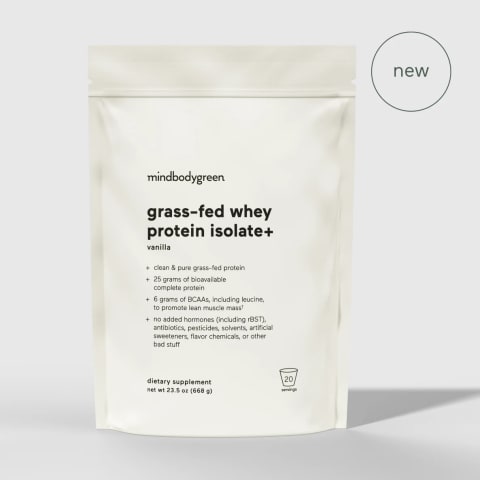Advertisement
3 Things A Nutritionist Wants You To Stop Putting In Your Coffee


While research supports numerous health benefits that come from a cup of coffee, the value starts to decrease when your daily brew is pumped full of cream and sugar.
If you love a sweet latte or your daily double-double, read on to learn about why it may be time to switch over to healthier alternatives.
3 things to leave out of your coffee
Research suggests daily coffee consumption reduces your risk of developing Type 2 diabetes. Coffee has been associated with a lower risk of death1 from all causes. And caffeine improves alertness2 and can help you become a better problem solver and creative thinker3. Of course, coffee is also beloved for its taste, association with ritual, and community element.
While coffee offers many health perks, loading your morning brew with a lot of added sugars may negate some of them, according to registered dietitian Mackenzie Burgess, RDN. Here are three things Burgess says to keep out of your coffee to leave its health benefits intact:
- Creamer: Creamers often contain added sugars, artificial flavors, corn syrup, or hydrogenated oils—all things that Burgess tries to limit. She recommends checking the ingredient list of your go-to creamer and aiming to avoid any ingredients that you can't pronounce. If you love your creamer too much to let it go, then try limiting yourself to one serving of it, which is usually a tablespoon. "Be mindful of that serving rather than making half of your coffee the creamer," Burgess says.
- Sugar: Too many added sugars in your diet can put you at an increased risk for diabetes and heart disease4, nullifying the benefits that coffee gives you in the first place. Burgess suggests reducing the amount of sugar in your cup of coffee to a teaspoon or less. Over time, you can gradually reduce your sugar even more until you're drinking your coffee black.
- Artificial sweeteners: Evidence on the health effects of low-calorie sweeteners, such as aspartame and sucralose, is "inconclusive," but Burgess suggests treating artificial sweeteners the same as sugar: "It's best to use both in moderation." However, stevia and monk fruit are two artificial sweeteners that the Food and Drug Administration recognizes as safe—and two that Burgess recommends using as replacements for sugar or other artificial sweeteners.
Try these instead
No cream and sugar? No problem. There are plenty of other ways to boost your coffee—and its health benefits.
A serving of collagen: Your morning coffee can double as an elixir for your hair, skin, and nails if you add collagen powder. A well-formulated collagen supplement will seamlessly incorporate into your coffee (hot or iced) and support gut health, joint health, and more with every sip. It'll also make your brew a bit more satiating. Here are nine of the best collagen supplements on the market to test out.
Spices: Adding spices like cinnamon, cardamom, or nutmeg can give your daily brew anti-inflammatory benefits, Burgess says. Mix them in with the grounds or after your coffee has already been brewed for a fragrant finish.
Coconut oil: Aside from lending a buttery, creamy flavor to your coffee, coconut oil has been shown to potentially help support digestion and gut health5. It can also help limit jitters brought on by coffee.
Date syrup: Dates are nature's candy. If you prefer your coffee sweet, Burgess suggests simmering dates in water (Medjool dates are especially good for this) and blending the liquid to create a naturally sweet syrup you can add to your coffee.
Protein powder: For a vanilla latte without all the added sugar, try Burgess' "proffee" recipe. Mix your favorite protein powder and milk (bonus points for whipping it with a milk frother) and add it to a hot or iced coffee. "It creates a creamer taste," Burgess says, adding that it's a fun way to increase your protein intake without a lot of extra filler ingredients.
The takeaway
To get the most health benefits out of your daily coffee without sacrificing flavor or richness, swap cream, sugar, and artificial sweeteners for healthier alternatives like collagen and coconut oil.

Why Nutrition Is Key To Changing Your Relationship With Alcohol
Brooke Scheller, DCN, CNS

Why Alcohol Sabotages Your Gut Health & How To Get Back On Track
Brooke Scheller, DCN, CNS

Why Nutrition Is Key To Changing Your Relationship With Alcohol
Brooke Scheller, DCN, CNS

Why Alcohol Sabotages Your Gut Health & How To Get Back On Track
Brooke Scheller, DCN, CNS

Why Nutrition Is Key To Changing Your Relationship With Alcohol
Brooke Scheller, DCN, CNS

Why Alcohol Sabotages Your Gut Health & How To Get Back On Track
Brooke Scheller, DCN, CNS

Why Nutrition Is Key To Changing Your Relationship With Alcohol
Brooke Scheller, DCN, CNS

Why Alcohol Sabotages Your Gut Health & How To Get Back On Track
Brooke Scheller, DCN, CNS















